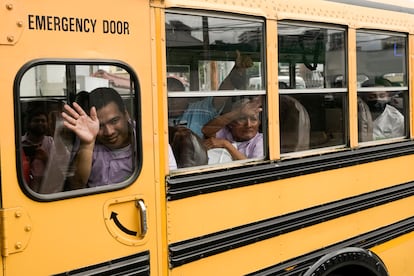‘Families broken by a dictatorship’: Christmas exacerbates the trauma of separation among Nicaraguans
More than 900,000 people have left Nicaragua since 2018 due to political persecution, the economic crisis and exile. In a country of just over six million inhabitants, almost every family has a loved one who is missing


Before the last week of November, Marcos’ family was excited about the trip they were going to make to Costa Rica. “We almost had our bags ready to go spend Christmas there with him... We already had the bus tickets to leave from Managua,” says one of the members of the large clan. But their plans suddenly fell apart when the regime of Daniel Ortega and Rosario Murillo ordered the Sandinista Parliament to approve a reform to the Immigration and Foreigners Law that legalized a practice that they had been unofficially enforced since 2021 for political reasons: denying foreign citizens and residents entry to or exit from Nicaragua. The updated law also introduced prison sentences and fines levied in dollars.
“The truth is that we were overcome with terror. We have made our lives in Nicaragua and risking going to jail for leaving, or being prohibited from returning to Nicaragua, is a risk that, as a family, we decided not to take… Although the grief really affects us emotionally, because we have not seen him for almost two and a half years, since he went into exile in Costa Rica due to the persecution against him,” one of Marcos’ relatives, who asked to remain completely anonymous to avoid reprisals, told EL PAÍS. Marcos is an opponent of the presidential couple, and his name is not Marcos either: it is a pseudonym that he also requested for security reasons.
“It hurts not being able to hug my sisters, my nephews, my cousins, my mother another Christmas. We’d decided the trip would be made secretly, because the government is cruel to relatives of exiled opponents, but we decided to take the risk because it has been too long without seeing each other. But when we saw that they had approved this immigration reform, with sentences of up to six years in prison for those who allegedly commit the crimes of undermining national integrity, or terrorism, that is, against whomever the dictatorship pleases, we aborted the plan, because the risk went through the roof. And we learned that surveillance had been reinforced at the Peñas Blancas border and at the blind spots of [irregular] passage,” Marcos tells EL PAÍS on a windy December afternoon in San José, Costa Rica, where he lives in exile.
The Marcos family’s story, aggravated by immigration reform, can be applied in some way to the families of more than 900,000 Nicaraguans who have fled since 2018 due to political persecution, the economic crisis, or banishments imposed by the presidential couple. One such recent case is that of Azucena Bracamonte Valle. After five years in Rome, the nun was returning to Nicaragua to spend the Christmas vacation with her family, but in Mexico, where she made a stopover five days ago, the airline notified her that the immigration authorities had denied her entry to Nicaragua for committing “treason.”
“Nicaragua suffers the largest exodus in its history”
On Christmas Eve and New Year’s Eve, especially in circles of exiles and politically banished people in different countries, the same complaint has been shared in recent weeks: cancelled family plans. Reunions torpedoed by the repression of the Ortega-Murillo regime, whose grip never stops tightening. In a country of just over six million inhabitants, almost every family has a loved one or a friend who has left the country. Especially among young people, according to figures from international organizations that keep count of a migratory and political phenomenon that the opposition group Concertación Democrática Nicaragüense Monteverde (CDN) describes as follows: “Nicaragua is suffering the largest exodus in its history.”
“Families separated by a dictatorship,” members of CDN, who also suffer family separation for political reasons, told EL PAÍS. In this sense, this opposition group — one of the main organized critics of the presidential couple in exile — launched the campaign “Every life tells us a story” with the purpose of lending visibility to this intimate drama that is not usually recounted and that remains hidden beneath the political ups and downs.
“After my birthday, December is one of the most beautiful months of the year, perhaps because we associate it with the family that saw us grow up,” says young María Laura Alvarado, a member of CDN and exiled in Costa Rica. “Since 2018, Nicaraguan Christmas traditions and family gatherings have been affected by the Ortega-Murillo dictatorship. Thousands of families have not spent Christmas with their relatives, like this one in 2024, when 46 people are still imprisoned for political reasons.”
In their campaign, CDN members explore the facets of family separation and gather these testimonies, they say, to “contribute to the construction of the historical memory of the feelings and longings of Nicaraguans affected by family separation, especially in this time of celebration and traditions [...] Six million of us bear the weight of family separation and suffer the absence of at least one loved one.”
Juan Sebastián Chamorro, a former political prisoner who was one of the presidential candidates arrested by the Ortega-Murillo regime, knew what it was like to spend Christmas in prison away from his family, since they were not allowed to see them. “The Nicaraguan people suffer from family separation and this Christmas should remind us that the future we must build for Nicaragua must be one of faith, joy, hope, and reunion for all Nicaraguans,” says the opposition leader.
However, the Sandinista presidency denies the opposition’s claims and, instead, “co-president” Rosario Murillo offers another vision in her television monologues: “This week leads us to Friday, for the Christmas and New Year holidays; the union of families on those festive days, when we give so much thanks to the heavenly father, to our child God, who gives us strength, brings us strength, more strength, more blessing,” she said on December 16. “Christ Jesus tells us: I give you peace, I leave you peace. And what is our duty? To preserve it, to restore it, because in peace, everything grows, we can do everything; we live in safety and stability, with the guaranteed right to work and prosper,” Murillo added.
When I show Marcos what Murillo said on TV, he shrugs his shoulders and replies: “It is the utmost cynicism of that woman. She and Daniel Ortega are the greatest destroyers of the Nicaraguan family. And as long as there is a dictatorship, we will continue to spend Christmases separated, beaten. The spirit of vengeance of those two is such that it is no longer enough to imprison people and strip them of their nationality, they also prevent us from reuniting with our loved ones. It is a chilling evil.”
Sign up for our weekly newsletter to get more English-language news coverage from EL PAÍS USA Edition
Tu suscripción se está usando en otro dispositivo
¿Quieres añadir otro usuario a tu suscripción?
Si continúas leyendo en este dispositivo, no se podrá leer en el otro.
FlechaTu suscripción se está usando en otro dispositivo y solo puedes acceder a EL PAÍS desde un dispositivo a la vez.
Si quieres compartir tu cuenta, cambia tu suscripción a la modalidad Premium, así podrás añadir otro usuario. Cada uno accederá con su propia cuenta de email, lo que os permitirá personalizar vuestra experiencia en EL PAÍS.
¿Tienes una suscripción de empresa? Accede aquí para contratar más cuentas.
En el caso de no saber quién está usando tu cuenta, te recomendamos cambiar tu contraseña aquí.
Si decides continuar compartiendo tu cuenta, este mensaje se mostrará en tu dispositivo y en el de la otra persona que está usando tu cuenta de forma indefinida, afectando a tu experiencia de lectura. Puedes consultar aquí los términos y condiciones de la suscripción digital.








































